
Curriculum
“The world is full of knowledge, and finding the links between fields of study can be a mind-twisting task. A classical education meets this challenge by taking history as its organizing outline — beginning with the ancients and progressing forward to the moderns in history, science, literature, art, and music. Systematic study also allows the student to join what Mortimer Adler calls the ‘Great Conversation’ — the ongoing conversation of great minds down through the ages.”
Susan Wise Bauer
Literacy & Composition
Literacy is central to the teaching at Liberty schools. We strive to equip our students with the knowledge to become great readers and writers, and we use a systematic phonics program to teach reading through spelling and writing.
In Kindergarten our students begin learning the sounds of the 72 phonograms and various spelling rules that make up our English language. Our students use a multi-sensory approach to learning their spelling words. They hear a word, say the word, write the word, and read the word all while discussing the rules behind each spelling pattern. Each grade progresses with this knowledge as students learn more difficult words. In fourth through sixth grades, students learn the Greek and Latin morphology behind their vocabulary words.
Students also write every day. In Kindergarten students begin writing sentences that are dictated by their teacher and begin writing original sentences by the end of the year. First graders write four-sentence paragraphs, third graders learn to write three paragraphs about a topic, and by the end of fourth grade, students are writing the five-paragraph essay.
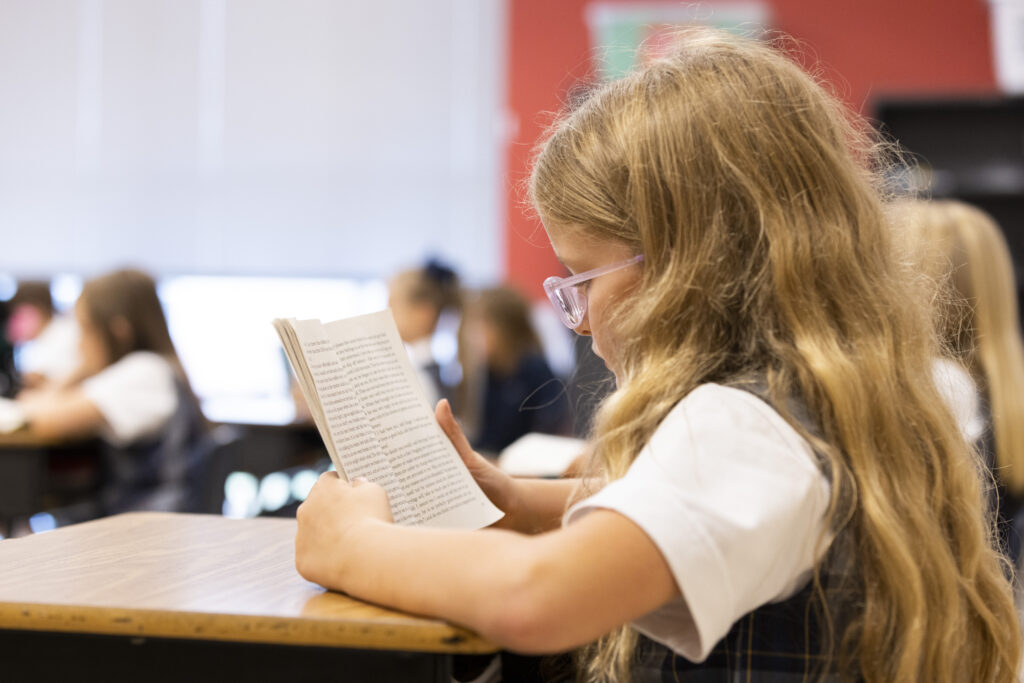
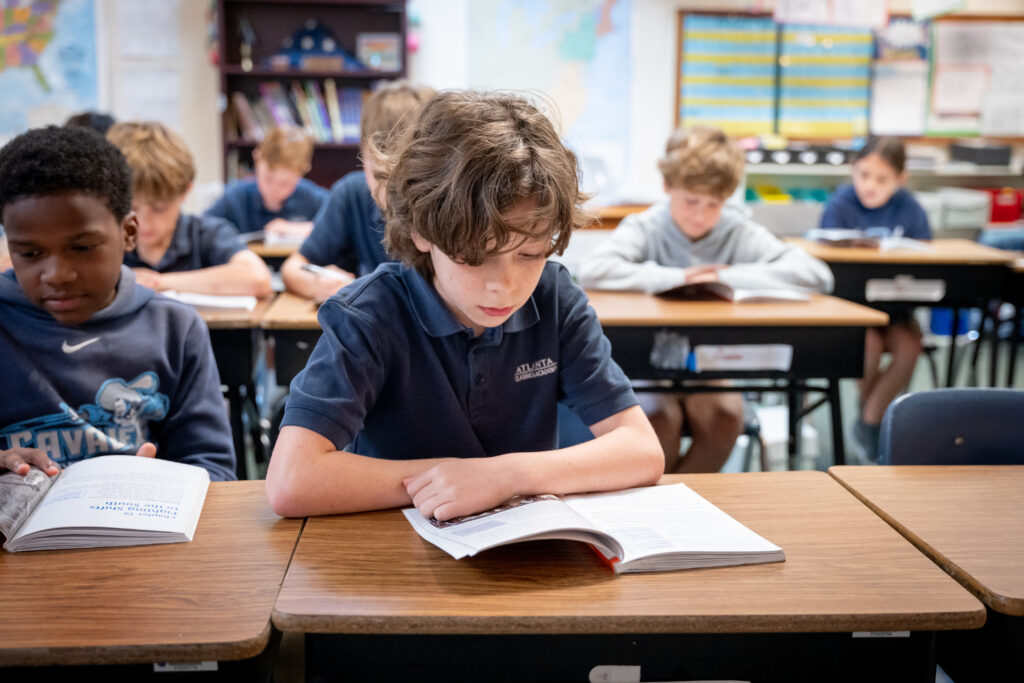
Literature
With a curriculum grounded in the Great Books, Liberty schools teach from the premise that classic works of literature should be read and discussed for their insights into human nature and how they portray and express that which is timeless and true. At the same time, because understanding the mechanics and structure of language is crucial to a student’s ability to comprehend, we have set aside a separate period for literacy in the lower grades. This allows us to devote undivided attention to the texts in a Literature class.
Students at Liberty partner schools will cover a vast body of literature during their educational careers. Each of these books reflects something that is good, true, and beautiful about the human experience and invites the reader to wonder at the age-old questions of the Western Heritage, and to participate in its chief one: what does it mean to live the Good Life? Each grade touches on its own facet of this question; in second grade, this looks like understanding what it means to be a good friend by reading Charlotte’s Web; in fifth, it is seeing how hatred causes people to treat others as less than human in The Narrative of the Life of Frederick Douglass; in ninth, it takes the form of discussing devotion to one’s family in the Iliad.
History
To achieve the goal of presenting the past and telling the human story from an unbiased perspective, history teachers at Liberty schools use primary source documents. Primary Sources are the windows that allow students to view how things really were. They show the original view of an idea or an event from people who lived during the time. Primary Sources allow the teacher to show and not just tell students about the past. They make the past more accessible and present the most unvarnished view of what took place. The use of Primary Sources allows for the past to be understood on its own terms. They bring history alive for students and prime their imaginations.
Two other tools for teaching history are “places and dates” and Socratic questioning. Places and dates are the foundation that allow students to dive into events and ideas. Geography and time help order a student’s thoughts and conceptions about a historical subject. Socratic questioning allows for a deepening of understanding. It tasks students with answering the “why?” and “so what?” questions. It forces students to understand what they think and defend it. Through a thoughtful education in history, the investigation of the past leads to Truth.
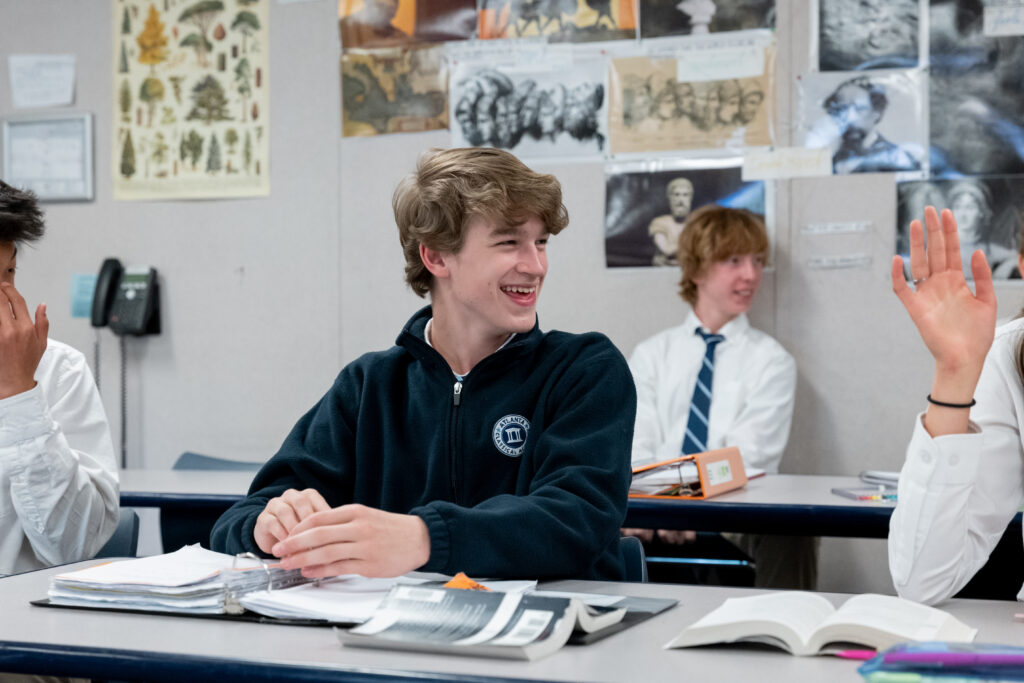
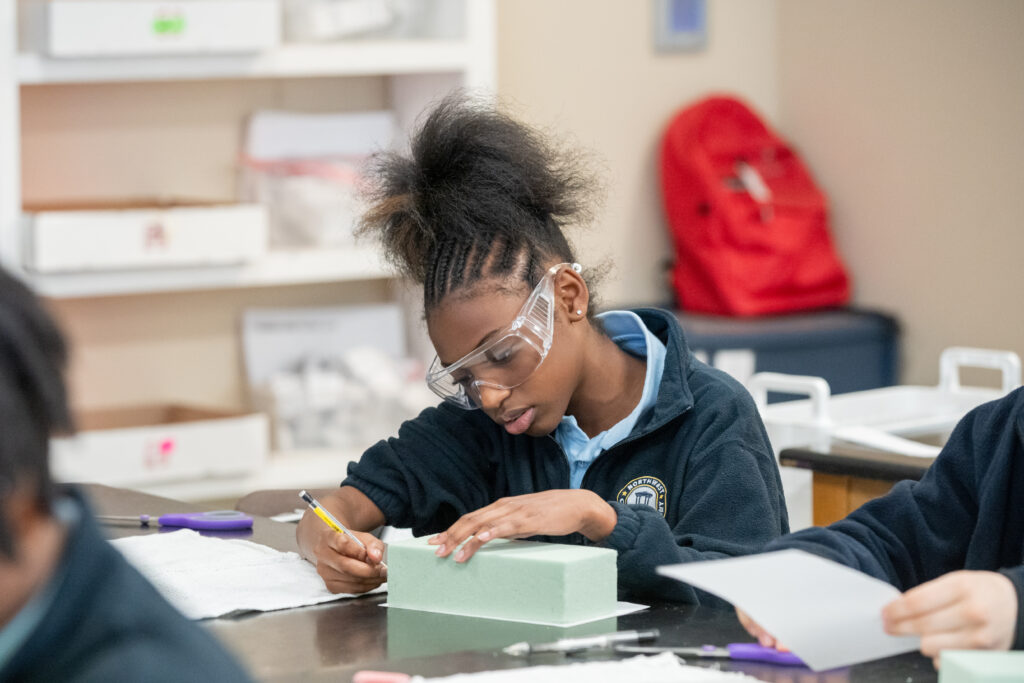
Science
“To conceive, understand and grasp the whole symmetry of the scientific edifice…is equivalent to tasting that enjoyment only conveyed by the highest forms of beauty and truth.” This quote from Dmitri Mendeleev, the initial architect of the periodic table, conveys the essence of what we aim to accomplish in our science classrooms at Liberty partner schools. Our ultimate goal is to build students’ knowledge about how and why the natural world works, so that they may come to appreciate and love the inherent beauty and truth of our universe.
Lower School students learn facts and vocabulary about subjects such as the human body, electricity, magnetism, insects, oceans, classification, light, sound, meteorology, and energy. Upper School students learn through a combination of traditional lectures about and hands-on exploration of enduring scientific laws, principles, and phenomena. Historical reflection about important scientists allows students to make connections between the successes and failures of humans and their determined pursuit of natural truths.
/
Mathematics
Liberty schools use Singapore Math in the Lower School. We use this approach because it aligns with our classical pedagogy of asking good questions to help students uncover the beauty and wonder of organizing and connecting numbers, shapes, and ideas. Students are not taught sight words in literacy but rather the phonograms and rules for decoding a word. Similarly, our work in math – moving from concrete to pictorial to abstract – makes the same progression and helps students think their way through increasingly difficult problems. We can pose challenging problems to students because we allow them to work with the building blocks before working with the big picture.
As Upper School students learn about the rules, patterns, and theorems of math classes, their hearts and minds become attuned to the rules and patterns in our world. They begin to recognize that we live not in chaos, but in a cosmos (an ordered universe) filled with patterns. Ordered thoughts and ordered affections lead to happiness. As humans, we also love patterns because they are beautiful to behold. They contain an element of mystery and cause us to wonder ‘Why is this pattern here?’ and ‘What other patterns may be hiding just beneath the surface?’ Such questions require a curious mind and patient diligence to ask and to answer. Therefore, we find that Order, Beauty, and Wonder are the principal ends of a mathematics education.
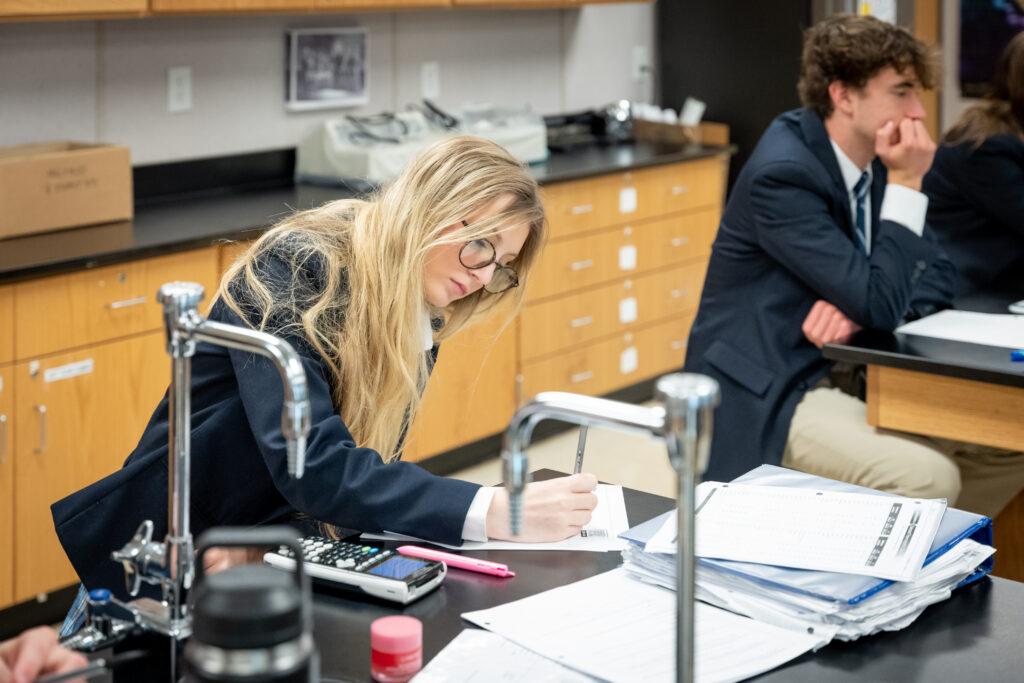
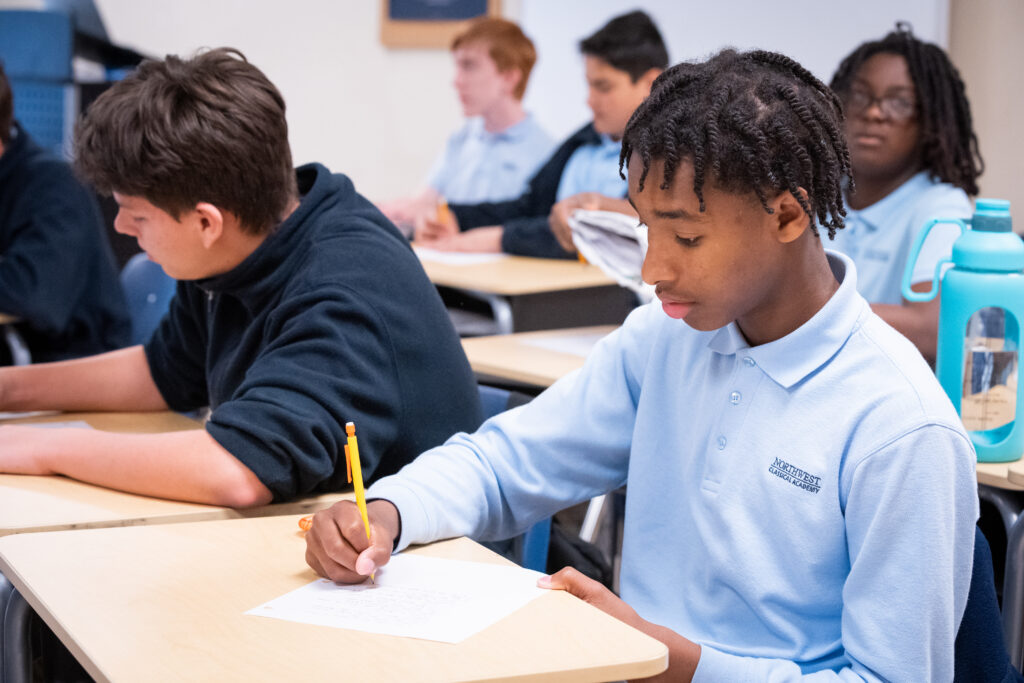
Foreign Language
The study of how another speech community’s use of language differs from one’s own enhances not only one’s understanding of the target language but also of one’s own language. This mastery of oral and written communication is critical to one’s intellectual development.
Liberty schools offer the two languages that are of most importance to Americans: Latin and Spanish. The importance of the latter language is derived from the presence of a large community of Spanish speakers within the US. The significance of Latin comes from the fact that, although English has been enriched by borrowings from a multiplicity of languages, Latin has been uniquely influential in the development of English as we know it today.
At Liberty schools, foreign language instruction begins with Spanish in 1st grade and continues through 4th grade. In 6th grade, all students begin Latin and continue with it through 8th grade. At the beginning of 9th grade, freshmen must decide whether to continue with Latin or begin Spanish. In high school, there is a three-year language requirement. A foreign language becomes an elective in 12th grade.
Fine Arts
At the Explore level, our K-6 Curriculum and Applied Courses create a solid foundation in the arts. At this beginner stage, students will have the opportunity to discover and investigate the arts, leading to a lifetime of appreciation and enjoyment.
At the Develop level, our 7th and 8th Grade Curriculum, Elective, and Applied Courses will further challenge students in their knowledge and techniques. This intermediate stage will also provide a way to teach the students about commitment and perseverance.
At the Challenge level, our Elective and Applied Courses will mold students who exhibit the passion, desire, and aptitude to take their craft to the highest point possible. To be accepted into this advanced stage, students must be recommended or submit an application that may also be accompanied by an interview or audition.
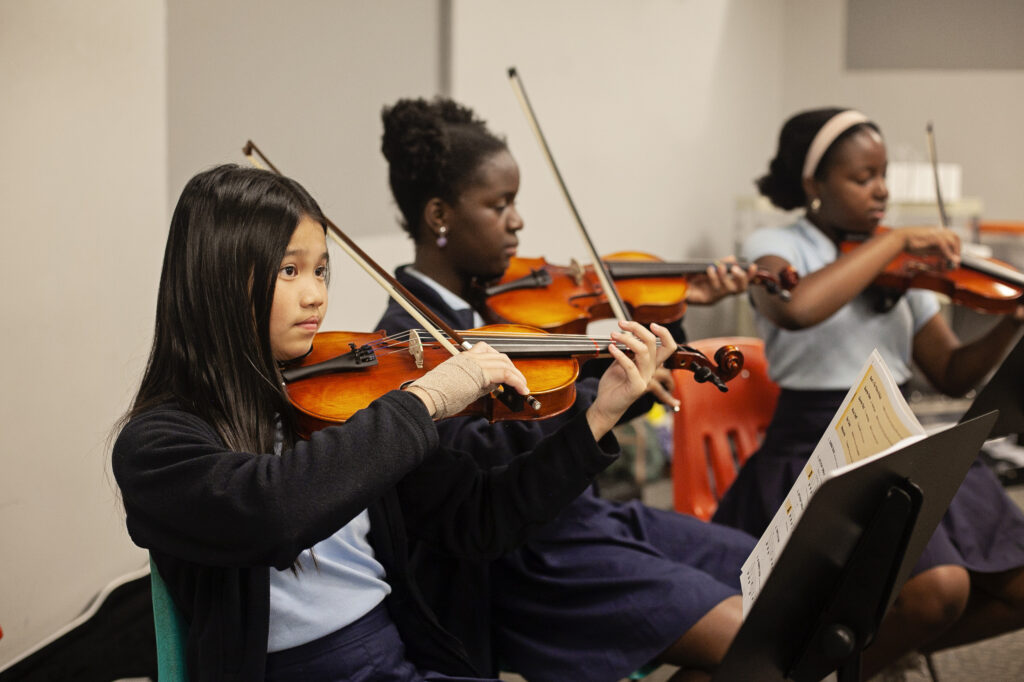
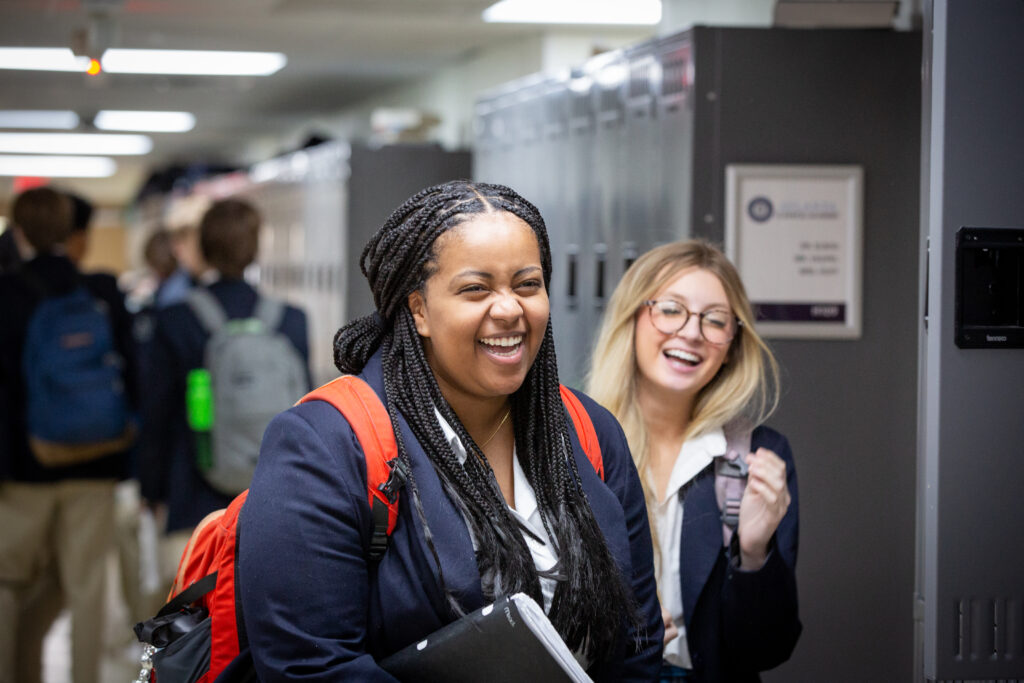
Senior Thesis
As a graduation requirement, seniors at Liberty schools write a 12-15 page paper on a topic they choose that is supported by texts they have read both in and out of class. They then present their thesis and defend it in an oral examination before a panel of faculty members.
“The senior thesis represents the culmination of our students’ intellectual formation at Atlanta Classical Academy. Under your watchful tutelage, our seniors will step from the confines of limited paper assignments to enact the work of close reading and analytical writing on a question emerging from their own study of what Mortimer Adler calls “the ideas we judge by”: what is true, what is good, and what is beautiful. An education at Atlanta Classical demands students to examine any written work with the end of acquiring the mind of the author or thinker, privileging their contributions to a conversation that preceded and will often outlast the reader’s own involvement. The thesis acts as the final test of this skill with the additional complexity of requiring students to contribute their own voices to this discussion.”
– Aaron Schepps, Upper School Principal at Atlanta Classical Academy

Sign up for our newsletter
Keep in Touch!
If you are interested in the work of Liberty Classical Schools, please submit your name and email. Stay up-to-date on Liberty news and ways to get involved.
